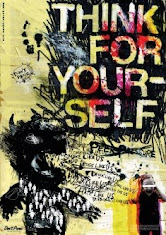Meanwhile Notre Dame treats Obama like the Iranian President Mahmoud Ahmadinejad... The news would have you believe that legislation to improve health care, equal rights for all Americans, the environment, and workers will turn us all into card carrying pinko commie hippies, pink triangles on our sleeves, letting the king of England steal your guns.
So between the pandemics, the threat of nuclear war, the moral disintegration, and the second red scare who has time to worry about the fact that American culture is now defined by Beyonce Knowles in a feature length cat fight, or the real house wives of new jersey. I am in mourning for art, culture, and mass taste. I cry for the ignorance of Americans who want to deny monogamous relationships to committed couples who could bring sanctity back to marriage.
Tell me what to fear and keep it manageable. Wear your masks, throw your hot dogs into the bon fire, say your prayers, and eat your vegetables.
Speaking of fear....
This article from the BBC should get you thinking that maybe its normal to want to scream from the windows "I'm mad as hell, and I'm not gonna take it anymore!"
Are we all capable of violence?
| By Diene Petterle |
It was one of the thorniest questions of the 20th Century and it remains a conundrum today. Are all "ordinary" people potentially violent?
The human race is both appalled and fascinated by violence. Man's aggression spans the globe - from terrorist attacks to guerrilla wars to gang-related crime.
It is everywhere, and it binds all nations and races together. But where does it begin? Do we learn it or is it something instinctive?
Most of us think of ourselves as calm and peaceful people.
We're brought up to try and resolve all conflict peaceably and tend to think that violence is something that "other" people commit, not ourselves. But is it?
Is it possible that you, or your mother or daughter or son, could ever be driven to commit a dreadful crime? Do we have that level of violence in ourselves?
The answer is yes.
Contrary to popular belief, we are born violent. Until the age of three, our impulses run riot. There is no stopping the urges which come from the emotional centre in our brains.
But as we grow up, we start to develop the part of the brain that allows us to control our aggression - the pre-frontal cortex. Yet crucially, how well this control mechanism works depends on our experiences.
Festival of violence
Being taught to share and take turns rather than resolve conflict with violence actually changes the physical structure of the brain and therefore makes us less aggressive.
But trying to resolve conflict peaceably is not something all cultures subscribe to. In the Bolivian Andes, one tribe settles disputes which arise over the year in an annual festival of violence, known as the Tinku.
| The way people with no history of violence committed atrocities during World War II has provoked much discussion |
Their warrior tradition dictates that men, women and even children should learn to fight and deaths are not unheard of.
Neuroscientist Maria Couppis argues that their brains are different from the norm because they were socialised to resolve conflicts this way.
This suggests that although we are all born with a violent potential, our upbringing and the environment play a key part in creating violence controls in our brain.
Not only are we born violent, we are also chemically programmed to love it. Inside the brain a pleasure-inducing chemical called dopamine is released when we fight.
Dopamine informs the brain that we're having a good time. But the problem doesn't stop there - the rush we get from dopamine can get us physically addicted to violence. The more we have it, the more we want it.
Primeval pleasure
Danny Brown, a former hooligan, knows better than most just how far one can go to get this "hit". He was sent to prison for stabbing a rival fan but even that didn't stop him. The rush of hooliganism was too strong to resist.
"I was never into drinking or drugs. Fighting was my heroin."
| Prof Charles Golden |
Fighting is a primeval pleasure controlled by the frontal part of the brain. But how easy is it for us to lose control? Crimes of passion are an everyday occurrence and perpetrators often don't know what came over them. How is this explained? What is it that drives them to lose it?
Neuro-psychology expert Prof Charles Golden says we can all easily lose control and commit an extreme act of violence. All we need is for there to be a breakdown in the pre-frontal cortex and that can be triggered by anything from a car accident or repeated blows to the head in a game of rugby.
In fact, physical injury is not the only way to cause the cortex to shut down. Depression, alcohol abuse, drugs, lack of sleep and even the natural ageing process can all injure our violence controls.
Control mechanisms
"One of my patients is a priest," says Prof Golden. "He spent all his life helping people and one day he had a car accident. In the hospital, the doctors sent him home saying he was completely fine.
"For a month he didn't notice anything was wrong. But then he had a fight with his wife and completely lost it. He very nearly killed her. So much so that she left him straight away.
| Many are forced into violent action and desensitised |
"The scary thing is that in your everyday life you just don't notice there's anything wrong. It's only when your violent impulses are triggered that you realise you are out of control. But by then it's probably too late."
It's hard to accept that we're born violent, that we enjoy it, and that all our control mechanisms can easily be broken.
But if we think about why most people get killed, it isn't because of a crime of passion or a sudden rush of violence - it is because of war and genocide. It is because someone deliberately decided to kill another person.
Emmanuel Jal, a former child soldier in the Sudan, has personal experience of how a traumatic experience can lead you to deliberately want to kill another human being.
He had a healthy and happy childhood until one day war tore his hopes for a normal life. His mother disappeared, his village was burnt down and he lost everything he had.
Justified aggression
He became convinced that the people who did this to him deserved to die, and joined the rebel army. With them, he killed and tortured many people.
He is now trying to re-build his life and share with the world the idea that violence only creates more violence.
Emmanuel Jal's experience is extreme. But how extreme does a situation need to be for you or I to be convinced that violence is justified against another person?
| Sometimes violence is explained by alcohol consumption or other factors |
Most of us can imagine that if someone harmed our children or loved ones, we might engage in violence. But could we ever harm someone who hasn't caused us any harm, merely because of an idea or ideology?
The much-cited Milgram experiment of 1961 suggests the answer might be yes. Members of the public were asked to give a shock to a "volunteer" every time they got an answer from a multiple questions test wrong. The shocks were to be increased incrementally, up until the lethal 450v shock.
What the participants didn't know was that the "volunteer" was acting and hadn't been receiving shocks. But still two-thirds were prepared to deliver the "fatal" 450v shock because of the supervision of a white-coated authority figure.
The experiment has often been used as the proof that we are all capable of violence within a certain framework. We struggle to accept this, but the science seems to suggest we are wrong.
http://news.bbc.co.uk/2/hi/uk_news/magazine/8043688.stm



0 comments:
Post a Comment